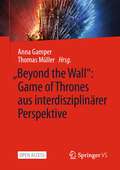- Table View
- List View
“Trash,” Censorship, and National Identity in Early Twentieth-Century Germany
by Kara L. RitzheimerConvinced that sexual immorality and unstable gender norms were endangering national recovery after World War One, German lawmakers drafted a constitution in 1919 legalizing the censorship of movies and pulp fiction, and prioritizing social rights over individual rights. These provisions enabled legislations to adopt two national censorship laws intended to regulate the movie industry and retail trade in pulp fiction. Both laws had their ideological origins in grass-roots anti-'trash' campaigns inspired by early encounters with commercial mass culture and Germany's federalist structure. Before the war, activists characterized censorship as a form of youth protection. Afterwards, they described it as a form of social welfare. Local activists and authorities enforcing the decisions of federal censors made censorship familiar and respectable even as these laws became a lightning rod for criticism of the young republic. Nazi leaders subsequently refashioned anti-'trash' rhetoric to justify the stringent censorship regime they imposed on Germany. Examines the connections between youth protection, social welfare, and censorship in late Imperial and Weimar Germany. Locates Weimar Germany's two censorship laws in post-war anxieties about gender and the new constitution's prioritization of social rights over legal rights. Uses anti-'trash' campaigns to examine national identity in late Imperial and Weimar Germany.
„Beyond the Wall”: Game of Thrones aus interdisziplinärer Perspektive
by Thomas Müller Anna GamperDieses Open-Access-Buch beleuchtet das Serienphänomen „Game of Thrones“ aus unterschiedlichen wissenschaftlichen Perspektiven: Die rechtswissenschaftliche trifft auf die sprach-, musik-, literatur- und sozialwissenschaftliche, ferner die (kunst-)historische, psychologische und theologische Perspektive. Die Beiträge zeigen auf, dass die Serie reiche Anknüpfungspunkte für die wissenschaftliche Forschung unterschiedlichster Fachrichtungen bietet, die auch dazu anregen, sprichwörtlich „beyond the wall“ zu denken. Das Buch spricht dabei sowohl ein interdisziplinäres wissenschaftliches Publikum als auch sonstige Fans der Serie an.

